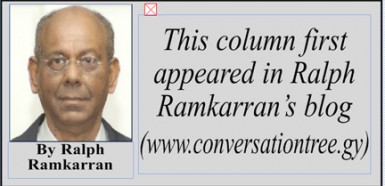
Political considerations were mainly responsible for the then combined APNU and AFC opposition to oppose the AML/CFT Bill, just as political considerations are now mainly responsible for the current opposition opposing the Bill.
There are many serious criticisms of the Bill. In anticipation of opposition to it, the Guyana Human Rights Association (GHRA) proposed several measures as long ago as August last year to avoid the “risk of prolonging ethnically divided politics.” It remarked that the appointment of the Director and Deputy Director be “ring fenced from partisan politics,” characterizing the Director as a ‘political commissar’ having regard to the manner of his or her appointment and range of powers given to officers. The PSC has also voiced criticism.
The Bill provides for the proposed appointee be recommended by the Parliamentary Committee on Appointments and approved by the National Assembly. This does not satisfy the GHRA’s suggestion of a two-thirds majority because, as Juan Edghill of the opposition PPP pointed out, the government has a majority on the Committee and in the Assembly. The powers to officers of SARA, in addition to those given under the Bill, include those of a police officer, an immigration officer and a revenue and customs officer, where conferred by the Minister. Many other suggestions were made by the GHRA which were ignored by the government.
Although the opposition has argued that the Bill is unconstitutional and that it will be challenged in court, the main thrust of its concern, expressed in the parliamentary debate, is that the Bill is directed at the opposition. With the threats of jail or other dire consequences against officials of the last government that have been pouring out from government spokespersons, tempered only by exposures of government’s own misdeeds, it is not surprising that the opposition feels the way that it does. But in any event, in Guyana’s politics, as elsewhere, the opposition’s role has long been defined in 1962 by Peter D’Aguiar to “oppose, expose and depose,” even if the objective “to depose” is not openly canvassed. When the PNC, PNCR, PNCR1G and APNU and AFC were in opposition, their strategy was no different from that of the current opposition.
Notwithstanding the above concerns, some of which I share, the Bill is a valuable addition to the AML/CFT Act in the battle against corruption. It is not the end. It is only the beginning. It is hoped that the politics that drove this Bill to the top of the government’s agenda will now recede in the background and a sustained legislative effort to contain government corruption and corruption generally will now ensue. Legislation must also remove the discretion, or at least tighten its exercise, to short circuit procurement practices, with severe penalties for doing so unauthorisedly. Equipped with an adequate body of laws, the more difficult task would be to eliminate corruption and create a culture of transparency.
The Bill is huge, with 107 sections. It provides for the establishment of the State Asset Recovery Agency, the appointment of its Director and Deputy, their functions and training and cooperation of SARA with other agencies. Disclosure of information is permitted from the DPP, Commissioner of Police, Director of the FIU, Head of SOCU, Chair of Integrity Commission, Commissioner General, Governor of the Central Bank, Head of CANU, Chair of Gold Board, Chair of the Tender Board and a Police Officer not below the rank of Inspector. The Bill provides for the civil investigation, preservation and recovery of State property which has been obtained through unlawful conduct. It enables SARA to obtain from the court a wide range of orders such as a restraint order, a civil recovery order, a disclosure order, a customer information order, a production order, an account monitoring order and a search and seizure warrant.
With these extensive powers, SARA can be successful. But it needs public support. To obtain this it must deploy its vast powers wisely and not overreach by pouncing with a car load of officers to seize a dozen, second hand, unserviceable, computers in opposition strongholds, like third rate policemen going after seasoned bandits.
It needs to transform itself from an agency given to highly charged verbal confrontations with politicians to a professionally led and managed agency.




